The Traveler… traveling to Rio de Janeiro… part of the “health test”??
February 10, 2011 by The Traveler · 1 Comment
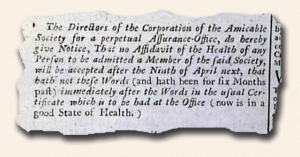 I decided to take my travels a like further back in time and to a place that always intrigued me. Through letters from Boston and Philadelphia, The London Gazette dated February 12, 1711 reported on a vessel that had been shattered from Rio de Janeiro. The French had landed and were being beaten off with the reinforcement of eight thousand men from the mines… the French retreated.
I decided to take my travels a like further back in time and to a place that always intrigued me. Through letters from Boston and Philadelphia, The London Gazette dated February 12, 1711 reported on a vessel that had been shattered from Rio de Janeiro. The French had landed and were being beaten off with the reinforcement of eight thousand men from the mines… the French retreated.
In my readings, I see numerous “An Act..” within newspapers, but found this one quite unusual. “An Act to enable John Lord Gower, Baron of Stitnham, an Infant, to make a Settlement upon his Marriage.” I wonder what the terms of the settlement were??
Last, the back page had an announcement about “The Corporation of the Amicable Society for the Perpetual Assurance-Office” for the Affidavit of the Health. The way the announcement read, this may have been part of the qualification testing… if you understood it all, then you were in good (mental) health.
~The Traveler
Early reports can be unassuming…
May 17, 2010 by TimHughes · Leave a Comment
 As many collectors have found, the earliest report of an historic or significant event is often not the best or more detailed. Usually the report of a day or two later is best, when all the particulars were known and the accuracy more credible. Yet there is still the fascination of reading of a major event before it would become part of world history.
As many collectors have found, the earliest report of an historic or significant event is often not the best or more detailed. Usually the report of a day or two later is best, when all the particulars were known and the accuracy more credible. Yet there is still the fascination of reading of a major event before it would become part of world history.
The first report of the Great Fire of London–one of the more notable events in 17th century British history–is somewhat unassuming. The bottom of the back page of “The London Gazette“, September 3, 1666, has a report datelined the day before noting: “About two a clock this morning a sudden and lamentable Fire brake out in this City, beginning not far from Thames Street, near London Bridge, which continues still with great violence, and hath already burnt down to the ground many houses thereabouts, which sad accident affected His Majesty with that tenderness, and compassion, that he was pleased to go himself in Person with his Royal Highness to give order that all possible means should be used for quenching the fire, or stopping its further spreading…” with a bit more (see).
The next several issues would provide more detail, but this first report gives some indication this was to be more than a small event. Indeed, it would grow to consume some 13,200 houses, 87 parish churches, and make homeless 70,000 of the city’s 80,000 inhabitants.
Never say never…
February 4, 2010 by TimHughes · Leave a Comment
It’s always interesting to find comments or actions which are later refuted or contradicted in history. I recently came across one such pair of reports which make for interesting reading and thought it worth sharing.
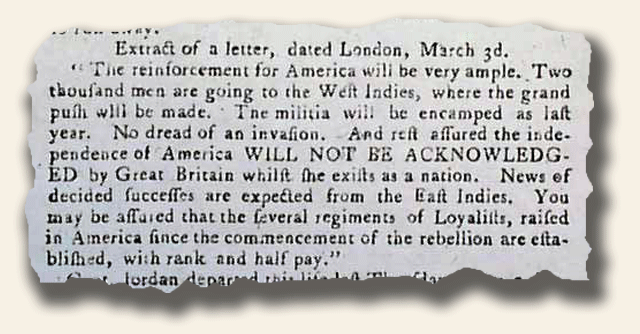 The “Pennsylvania Evening Post” of Philadelphia, May 11, 1779 contains a letter from London which includes: “…And rest assured the independence of American WILL NOT BE ACKNOWLEDGED by Great Britain whilst she exists as a nation…”. A few years later the “London Gazette” of Dec. 7, 1782 includes a report from the King noting: “…I did not hesitate to go the full length of the powers vested in me & offered to declare them Free and Independent States, by an Article to be inserted in the Treaty of Peace…”.
The “Pennsylvania Evening Post” of Philadelphia, May 11, 1779 contains a letter from London which includes: “…And rest assured the independence of American WILL NOT BE ACKNOWLEDGED by Great Britain whilst she exists as a nation…”. A few years later the “London Gazette” of Dec. 7, 1782 includes a report from the King noting: “…I did not hesitate to go the full length of the powers vested in me & offered to declare them Free and Independent States, by an Article to be inserted in the Treaty of Peace…”.
This would be a great pair of issues to display side by side.
Are you aware of similar situations in history where newspaper reports of both make for fascinating pairs? Feel free to share.
Walmart sells them too…
December 12, 2009 by TimHughes · Leave a Comment
A 1685 issue of the “London Gazette” newspaper contains on the back page the following interesting advertisement, not the type typically found in newspapers–at least not in more modern times. Interesting that the coffin maker notes that he makes them: “…of a sort of wood that will endure until the body is fully dissolved…”.
I saw a piece recently where Walmart now sells coffins on-line. And just in time for Christmas:
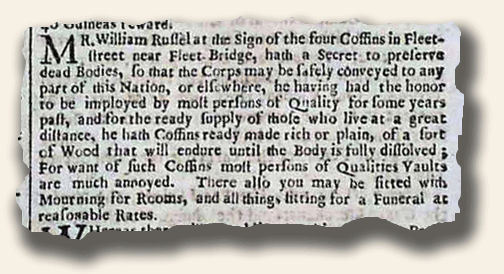
So what’s the earliest “London Gazette”?
May 21, 2009 by TimHughes · Leave a Comment
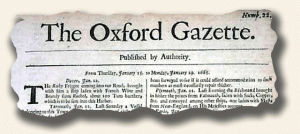 The world’s oldest continually published newspaper was begun in 1665 and still prints today, a staggering 345 year history which likely will never be broken by any other single title. Indeed, the newspaper still publishes today so it sets a more unbeatable record as each year passes.
The world’s oldest continually published newspaper was begun in 1665 and still prints today, a staggering 345 year history which likely will never be broken by any other single title. Indeed, the newspaper still publishes today so it sets a more unbeatable record as each year passes.
The newspaper is titled “The London Gazette“, but collectors have occasionally seen issues of “The Oxford Gazette” and wondered about the connection.
First, the most convincing derivation of the term “gazette” is from “gaza”, the Greek word for a treasury or store. That newspapers are a “treasury or store” of information would allow for a plausible adoption of the term “gazette”.
In 1665 the Royal Court had been removed from London due to the Plague which had been ravaging the city. The smaller towns in the country seemed less susceptable to the contagion. So with a newspaper serving as a mouthpiece of the Royal Court it was logical that it would set up shop in Oxford, calling itself “The Oxford Gazette“.
But when the affects of the Plague seemed to have abated sufficiently for the Court to return to London, so did the newspaper. Twenty-three issues were published in Oxford, and with issue number 24 was the first with the title “The London Gazette“, a title which has remained unchanged for over three centuries.
So there might be a bit of a debate as to what the earliest issue is of “The London Gazette“. The earliest with this title would be issue #24, dated February 5, 1665 (1666 by today’s calendar), but argument certainly could be made that the first issue of “The Oxford Gazette” would qualify, it dated November 16, 1665.
Given its short life under the earlier title of “The Oxford Gazette”, such issues are extremely elusive. We have sold many over the past 33 years but rarely find them today.
Double-dated newspapers: the Julian and Gregorian calendars…
April 9, 2009 by TimHughes · 1 Comment
 If you have some 1600’s newspapers in your collection you may have a few with dates showing years as “1683/4″ or 1686/7”, or perhaps you have a few issues from a single year where a later date has an issue number lower than an earlier date, and you’ve wondered “how could this be?” Well, it’s due to the calendar, or more specifically which calendar was in use at the time.
If you have some 1600’s newspapers in your collection you may have a few with dates showing years as “1683/4″ or 1686/7”, or perhaps you have a few issues from a single year where a later date has an issue number lower than an earlier date, and you’ve wondered “how could this be?” Well, it’s due to the calendar, or more specifically which calendar was in use at the time.
Although the differences between the older Julian calendar and our current Gregorian calendar are many and very complicated and can be understood by visiting this site, the short answer is that in the latter part of the 17th century & a portion of the 18th century both calendars were in use in England, and the date of the issue would reflect which calendar was in use.
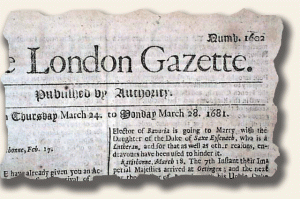 The new year of the older Julian calendar began on March 21, so an issue dated March 17, 1675 would be followed by the next weekly issue dated March 24, 1676. This would also mean that an issue dated December 31, 1675 would be followed by an issue dated January 7,1675. This was how the London Gazette dated it’s issues for much of the 17th and early 18th centuries. At first glance one would think that the issue of Jan. 7, 1675 was older than one dated December 31, 1675, but the opposite was true.
The new year of the older Julian calendar began on March 21, so an issue dated March 17, 1675 would be followed by the next weekly issue dated March 24, 1676. This would also mean that an issue dated December 31, 1675 would be followed by an issue dated January 7,1675. This was how the London Gazette dated it’s issues for much of the 17th and early 18th centuries. At first glance one would think that the issue of Jan. 7, 1675 was older than one dated December 31, 1675, but the opposite was true.
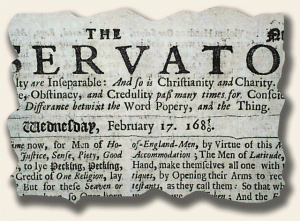 Other titles were a bit more helpful in noting the year of publication by dating issues from January 1 thru March 20 with a double-dated year such as “1684/5” or “1686/7” so the reader would know that it was from the year 1684 under the Julian calendar, or 1685 under the Gregorian calendar.
Other titles were a bit more helpful in noting the year of publication by dating issues from January 1 thru March 20 with a double-dated year such as “1684/5” or “1686/7” so the reader would know that it was from the year 1684 under the Julian calendar, or 1685 under the Gregorian calendar.
Some American newspapers of the 18th century have similar double dates, but by the beginning of the 19th century–if not reasonably before–newspapers had converted exclusively to the Gregorian calendar. The same was true with most of the Western world, while other portions of the globe adopted the Gregorian dating system much later.
Hopefully this answers a few questions you have had. Be in touch if we can be more helpful!


